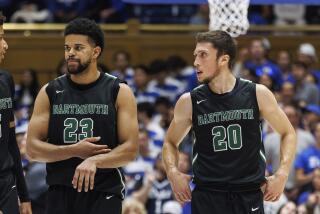A Foul Call in Euroball : Americans Find That Often It Can Be Play for No Pay
- Share via
TOULOUSE, France — After the professional basketball team in this southwestern French city lost its first nine games this season, the owners sent identical letters to the two American players on the squad.
The letters instructed the players, veterans Donald Petties and Kevin McDuffie, to turn in their car keys, pay their phone bills and clear out of their apartments. It offered them $2,000 cash and a one-way ticket to the United States.
“We assure you of our sympathy and wish you all the best,” concluded the letters, signed by an aide to the president of the Racing Club of Toulouse (pronounced “to lose”) basketball team.
Trouble was, Petties and McDuffie had guaranteed contracts. The $2,000 was only a fraction of the money the team owed them. Thus began a war of attrition between the two players and the Toulouse club.
The players hired an attorney, hid their team-supplied cars to avoid repossession and refused to leave town. The club continued to refuse to pay them, blocked them from joining other teams in Europe and hired two other Americans to replace them.
Welcome to professional basketball in the European leagues. It’s a special kind of basketball: You play and they sometimes pay.
For a select few young Americans, Euroball has been a refuge of financial comfort and distant glory in the sport they love. In his heyday on an Italian club in Venice, former American star Spencer Haywood even had a private gondola at his disposal.
But for many other players in the basketball backwaters of the Old World, the experience is one of broken contracts, exploitive agents and bitter lawsuits. Often as not, the American players, not covered by the labor laws that protect European players, are forced to go home with only part of the money they were promised.
“I’ve seen it before,” said Bernard Grinspan, Petties and McDuffie’s French attorney. “They get these guys to come over here and they don’t pay them, just because they don’t put enough points in these baskets. It’s like ‘Les Miserables’ or something. I’m pretty disgusted.”
Charles Grantham, executive director of the NBA Players Assn., said: “The mind-set of the owners in some parts of Europe seems to be that they will pay the Americans as long as they are playing well and the team is winning. But once they decide they want to change the player for whatever reason, guaranteed contract or not, they stop paying. Their attitude is, ‘If you don’t like it, sue me.’ ”
Alarmed over the increasing number of contract disputes involving European clubs, the players’ association is trying to pressure the NBA and the Munich-based world governing body, the International Federation of Basketball Associations (FIBA), to blackball clubs that do not honor guaranteed contracts.
At about the same time as the Toulouse affair but in another corner of France, a second-division club in a town inappropriately named Proville was on a losing streak and informed its star American forward, John (Chuckie) White, that it no longer needed his services. They hoped someday to pay him the $40,000 they owed him on his “guaranteed” contract--but in the meantime, they asked, would he kindly recommend another American, preferably a point guard, who might be able to replace him on the team?
In a display of sportsmanship some might find remarkable, White recommended Keith Smart, a former teammate at Indiana University, for the job. Now Smart is in Proville, staying in White’s former apartment. White is back home in Charlotte, N.C., waiting for an overdue check from the team.
“The more powerful the teams are, chances are better that the players eventually will be paid,” said Bernard Delire, a Belgian agent who represented Petties and McDuffie. “But on a bad team with a small budget, 90% of the time they won’t get their money.”
Under European rules, each team is permitted a quota of two foreign players, usually Americans. Each year, about 1,000 Americans, ranging from college dropouts to fading NBA veterans, make the jump to pro teams in a dozen European and Middle Eastern countries.
Some of the players hit the jackpot. Former UC Irvine star Kevin Magee, an 11-year Euroball veteran who never played in the NBA, earns $550,000 per year with a Paris club, enabling him to buy a large house in Orange County.
But veteran players such as Magee have learned to be leery of promises and to keep an eye on the fine print.
“In my 11 years, I’ve never had any problem getting my money, thank God,” Magee said after a recent game in Paris. “There are a lot of teams out there that promise you the world but once you get there and start losing, don’t want to pay you. Players have got to be careful.”
The contract problems of Americans Petties and McDuffie in Toulouse, recruited to play on a hopelessly inept team with a total annual budget of less than $500,000, are somewhat typical.
For several years, Racing Club of Toulouse has struggled at the bottom ranks of the 29-team first division of French professional basketball. Toulouse, the French aerospace capital, is a prosperous city with a metropolitan population of nearly 600,000. But the main sports of the region are rugby and soccer. The basketball team is lucky to draw 1,000. Except for an Indian restaurant, a hair salon and a few other small businesses that advertise on the gymnasium walls, it has no sponsors.
When Petties, 29, a 6-foot-4 shooting guard from Ann Arbor, Mich., and McDuffie, 24, a 6-8 forward from Baltimore, showed up for practice in September, they were warned by their coach, Daniel Perreard, not to expect too much from their French teammates.
“You’ve heard about the Dream Team,” said Perreard, whose record at Toulouse over the last three seasons is 18-57. “What I’ve got here is the Nightmare Team.”
One of the team’s starting players, Yaya Bendib, 22, practiced the other day in a T-shirt advertising farm-raised poultry and giggled delightedly every time he made a shot. The team was 0-17 after the second week of December, even with a new pair of American players, former Texas Tech center Steve Miles and former UCLA forward Charles Rochelin.
“I couldn’t believe it when I got here,” said McDuffie, a broad-shouldered former player at Northeastern University in Boston. “It was like I was playing with a bunch of kids who had never heard of even the most basic fundamentals.”
Petties, who played at Western Michigan in Kalamazoo before hitting the European circuit, agreed. “The worst team I’ve ever played for,” he said.
But both players had already bounced around, playing for lower division teams in other countries. McDuffie played in Holland, where he was the league’s most valuable player, and Belgium. Petties played on teams in Canada, Holland, Germany and Finland. So both players were delighted when Belgian agent Delire offered them jobs in Toulouse, even though the pay, $36,000 each, was close to the minimum.
The club’s recruiting director asked Delire for two Americans, a taller inside player and an outside player capable of making three-point shots. On Delire’s recommendation, McDuffie and Petties were signed and hired, sight unseen. The coach and management had never seen film of them in action.
“I didn’t know anything about the players but their statistics,” Perreard said. “But the same agent had supplied us American players for the past five years, and we’d never had any problems.”
But when the team lost its first few games by lopsided scores, pressure mounted for a change.
In an interview with La Depeche, the Toulouse daily newspaper, Perreard said the main problem with the team was the young and inexperienced French players. But league rules and national labor laws forbid dismissal of French players after a June 1 deadline for player cuts. Perreard told club President Jean-Claude Hebrard, a Toulouse certified public accountant, that he wanted to “exchange the Americans.”
On Oct. 28, Hebrard sent each of the players a letter, informing them that they were fired because of “insufficient performances during the first nine games of the season.” The players at that point had been paid $8,000. Hebrard offered each $2,000 more and a plane ticket home.
In the same situation on other European teams, many U.S. players have taken the token money and left. McDuffie and Petties decided to dig in. They hid their cars on side streets and were safe in their apartments because of a French law that prevents evictions, for whatever cause, in winter.
“I’ve seen players in the past who had been released and who just went home without their money,” said Petties, whose wife and two children live in Calgary, Canada. “But we knew our contracts were guaranteed and that we had done nothing wrong. We decided we were going to fight for it.”
Through their agent, they were put in contact with Grinspan, an attorney in the Paris office of the large Los Angeles firm, Gibson, Dunn & Crutcher. Grinspan, a French lawyer who also has a degree from Harvard Law School, learned about the dubious contract practices in the French pro leagues when he successfully handled a similar case two years ago.
Although the players lost their first appeal to a labor arbitration board in November, Grinspan put a full-court press on the basketball club by sending letters to a long list of public officials in the region, including Dominique Baudis, Toulouse’s influential mayor and a national political figure.
The letters to Baudis appear to have worked, at least in getting the players a bigger portion of their money. Nearly half of the team’s budget comes from a grant by the city of Toulouse. Because of the controversy, some members of the Toulouse city council have recently begun to question renewing the annual $200,000 grant to the team.
“If the grant is not renewed, the basketball team is finished,” said Hebrard, the club owner.
He said the players have been offered a settlement of $15,000, but left the impression that the club might pay more to be rid of the case. On Dec. 8, Hebrard rescinded his letter banning the players from accepting jobs on other teams.
“I just want to get the whole thing settled,” Hebrard said nervously, “so that the souffle doesn’t fall flat.”
More to Read
Go beyond the scoreboard
Get the latest on L.A.'s teams in the daily Sports Report newsletter.
You may occasionally receive promotional content from the Los Angeles Times.










